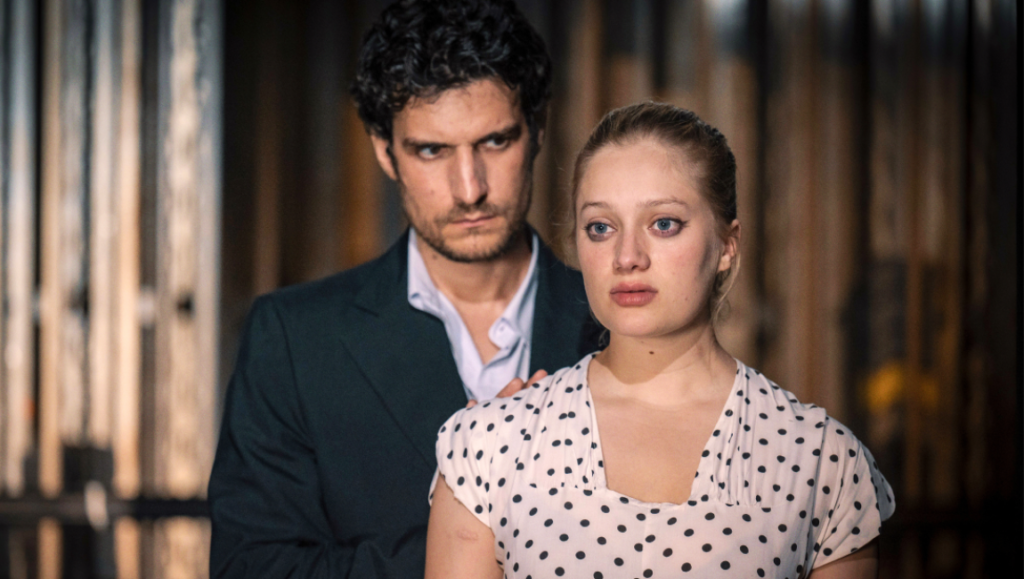The latest film from French actor-director Valeria Bruni-Tedeschi is difficult to evaluate. One could argue that, for what it is, it is fairly accomplished. A showcase for mostly young talent, including some performers making their film debut, Forever Young is exuberantly melodramatic, the film’s form matching its protagonists’ heightened emotions and desperation to be understood. I suspect that a certain kind of viewer might well find Bruni-Tedeschi’s film swoony and romantic, a full-throttle tribute to the heedlessness of young adulthood.
All of which is to say that Forever Young is two solid hours of theater-kid energy, a film that wholeheartedly believes that the art of acting is a beautiful, agonized, possibly holy mission, and if (like me) you don’t exactly subscribe to that ideology, this is an incredibly irritating film. Its French title, Les Amandiers, refers to a real-life theater studies program that Bruni-Tedeschi herself took part in in the late 1980s, one that was led by legendary film and stage director Patrice Chéreau (here played by the omnipresent Louis Garrel). But the English title, probably intended as a celebration of the freedom of youth, actually betrays a deep investment in arrested development.
This is an autobiographical work, but one that is entirely self-serving and ego-driven, the sort of thing you might expect if Glee’s Rachel Berry were a real person and got the chance to vomit her blinkered worldview onto the silver screen. Lead character Stella (Nadia Tereszkiewicz), like the director herself, is a child of enormous privilege. I don’t know exactly how accurately Forever Young reflects Bruni-Tedeschi’s own upbringing. Whether she, like Stella, grew up in an upper-class compound and had a butler (Franck Demules) for a surrogate parent, I can’t say. But it’s hard to ignore the rather flattering self-portrait Stella represents. Like the director, she is blonde, with piercing blue eyes, and — in the film’s dramatic universe — almost everyone is dying to sleep with her.
To be fair though, practically everyone is screwing everyone else in this demimonde, but most of the focus is on Stella’s benighted relationship with Étienne (Sofiane Bennacer), the “bad boy” of the theater class who is intermittently homeless and consistently hooked on heroin. Bruni-Tedeschi asks us to understand these young performers’ dissolute personal lives not as a hindrance to their art but as its spiritual fuel. Method acting is a fetish, and possibly a cult, in that it assumes that theatrical creation is borne only from torment, the demand to push one’s behavior beyond the borderline of rationality. Industry actors live for this stuff, which is why they love to bestow awards on their peers for conspicuous suffering — losing or gaining 50 lbs., consuming raw bison liver in subzero conditions, or “bravely” abandoning glamor in favor of disconcerting ordinariness, with split ends and bad teeth.
A few years ago, Robert Pattinson made a shrewd observation. “You only ever see people doing method when they’re playing an asshole,” he remarked. “You never see someone just being lovely to everyone going, ‘I’m really deep in character.’” In a way, Forever Young is a tribute to precisely this kind of asshole behavior as well as to a coterie of performers for whom tedious solipsism — the fundamental state of being for middle-class white people in their early twenties — is treated as the precondition for a visionary avant-garde. In Bruni-Tedeschi’s precious bubble, the loss of loved ones and even the AIDS crisis are little more than affect-fodder, a set of emotional memories that seize these children and then quickly dissipate, all to ensure that the show will go on.
Published as part of InRO Weekly — Volume 1, Issue 10.


Comments are closed.